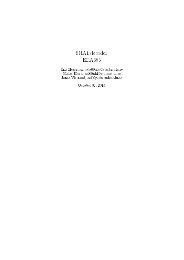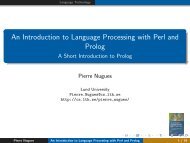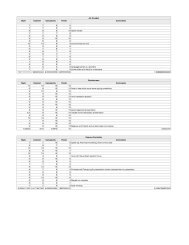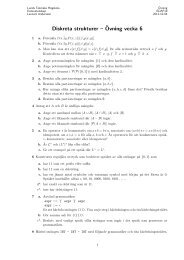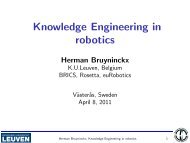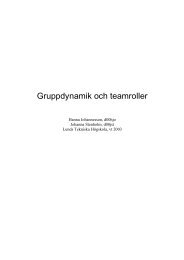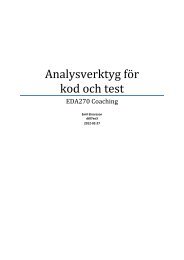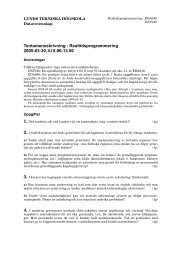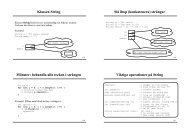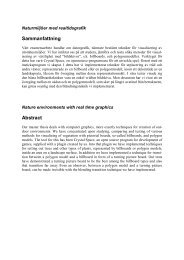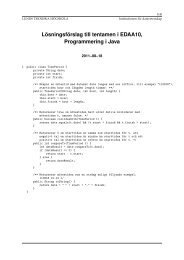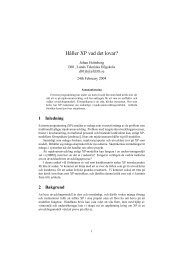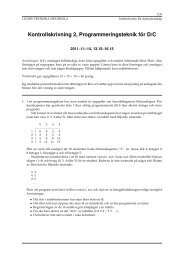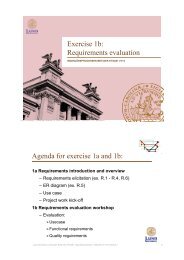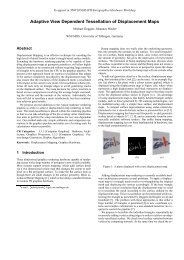Laboratory Exercises, C++ Programming
Laboratory Exercises, C++ Programming
Laboratory Exercises, C++ Programming
Create successful ePaper yourself
Turn your PDF publications into a flip-book with our unique Google optimized e-Paper software.
26 Strings and Streams<br />
A2. The Sieve of Eratosthenes is an ancient method for finding all prime numbers less than<br />
some fixed number M. It starts by enumerating all numbers in the interval [0, M] and<br />
assuming they are all primes. The first two numbers, 0 and 1 are marked, as they are not<br />
primes. The algorithm then starts with the number 2, marks all subsequent multiples of<br />
2 as composites, and repeats the process for the next prime candidate. When the initial<br />
sequence is exhausted, the numbers not marked as composites are the primes in [0, M].<br />
In this assignment you shall use a string for the enumeration. Initialize a string with<br />
appropriate length to PPPPP...PPP. The characters at positions that are not prime numbers<br />
should be changed to C. Write a test program that prints the prime numbers between 1<br />
and 200 and also the largest prime that is less than 100,000.<br />
Example with the numbers 0–27:<br />
1 2<br />
0123456789012345678901234567<br />
Initial: CCPPPPPPPPPPPPPPPPPPPPPPPPPP<br />
Find 2, mark 4,6,8,...: CCPPCPCPCPCPCPCPCPCPCPCPCPCP<br />
Find 3, mark 6,9,12,...: CCPPCPCPCCCPCPCCCPCPCCCPCPCC<br />
Find 5, mark 10,15,20,25: CCPPCPCPCCCPCPCCCPCPCCCPCCCC<br />
Find 7, mark 14,21: CCPPCPCPCCCPCPCCCPCPCCCPCCCC<br />
...<br />
2 The iostream Library<br />
2.1 Input/Output of User-Defined Objects<br />
We have already used most of the stream classes: istream, ifstream, and istringstream for<br />
reading, and ostream, ofstream, and ostringstream for writing. There are also iostream’s that<br />
allow both reading and writing. The stream classes are organized in the following (simplified)<br />
generalization hierarchy:<br />
ios_base<br />
ios<br />
istream ostream<br />
iostream<br />
ifstream istringstream fstream stringstream ofstream ostringstream<br />
The classes ios base and ios contain, among other things, information about the stream state.<br />
There are, for example, functions bool good() (the state is ok) and bool eof() (end-of-file has<br />
been reached). There is also a conversion operator void*() that returns nonzero if the state is<br />
good, and a bool operator!() that returns nonzero if the state is not good. We have used these<br />
operators with input files, writing for example while (infile >> ch) or if (! infile).<br />
Now, we are interested in reading objects of a class A from an istream using operator>> and<br />
in writing objects to an ostream using operator(std::istream& is, A& aobj);<br />
std::ostream& operator



